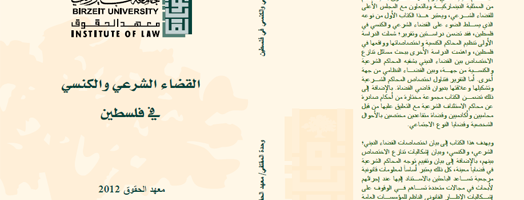The Institute of Law Publishes the Family Courts in Palestine
January 2012, the IoL implemented the project with support from the Representative Office of Denmark to the Palestinian Authority and in cooperation with the High Council of Family Courts.
The Family Courts in Palestine includes two research papers and a report. The first paper addresses organisational structure, jurisdiction and status of ecclesiastical courts in Palestine. The other covers conflict of jurisdiction between family and regular courts. The report provides an overview of the organisational structure, formation and jurisdiction of Sharia courts, highlighting the working relationship between these courts and Office of the Chief Justice. The publication also includes a select collection of judgements entered by the Sharia Court of Appeals in Jerusalem and Sharia Court of Nablus. Comments on these judgements are contributed by renowned lawyers, academics and retired judges with relevant experience in personal status and gender issues.
The Family Courts in Palestine delineates jurisdiction of family courts as well as conflict of jurisdiction between them. It assesses Sharia courts’ approach to certain cases. The book furnishes an authoritative reference text, which helps researchers compile interdisciplinary research papers that explore problems associated with the regulatory framework of public institutions. It also helps examine the relevant code of conduct and working relationship between public institutions and individuals. To materialise set goals, the code of conduct will provide a keystone in building a modern democratic state.
On this occasion, the IoL extends its thanks and gratitude to all those who have implemented the Building Family Courts Database project and contributed to publishing this book. Highly appreciating their effort, the IoL particularly thanks the Representative Office of Denmark to the Palestinian Authority and High Council of Family Courts.






